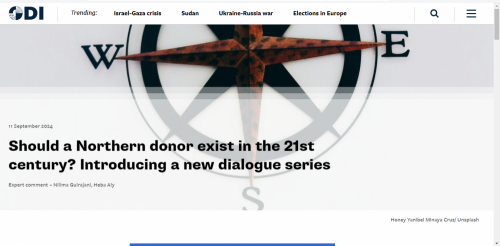
https://odi.org/en/insights/should-a-northern-donor-exist-in-the-21st-ce...
A new rationale for Northern development cooperation is desperately needed.
Official Development Assistance (ODA) was introduced in the 1960s as a temporary instrument to respond to a particular moment in history, amid decolonisation, the Cold War, industrialisation and poverty reduction efforts in the ‘Global South’.
But in a world where the lines between ‘developed’ and ‘developing’ countries is increasingly blurred; where strained development budgets are not growing in line with growing needs; where geopolitical polarisation between North and South is building historic levels of distrust; and amid a rejection of a donor-recipient model of aid-induced development as charity, the traditional rationale for aid has reached its limits.
This is the backdrop for an era ODI is calling a 'post-aid' world. A post-aid world does not mean acute global needs do not exist, nor that donors are completely shirking their efforts to address them. Rather, it is a reference to a crisis of legitimacy and relevance for the entire endeavour of Northern donorship.
Given this, we believe the time has come to go back to basics and ask: Why should a Northern donor exist today, and what should the rationale for its engagement be? What could a reinvigorated purpose and policy for development cooperation in the Global North look like?
Competing demands on donor money
The scale and range of problems donor institutions are now seeking to solve is vast. Newer global priorities like climate action and refugee resettlement have been bolted onto older ones like fostering gender equality, reducing poverty and hunger, and creating jobs.
Political expectations are now placed on concessional public finance to deliver on multiple agendas for an ever-widening group of stakeholders. Countering China and stemming migration, averting climate catastrophe to safeguard future generations, leveraging public resource to grow private investment and offering reparations for past injustices all inform claims on the purpose and rationale of development cooperation today.
And yet, concessional public finance has not grown in proportion with these additional demands (even if ODA stood at an all-time high in 2023). Instead, what we see are 'foreign aid' resources underwriting an expansion of international diplomacy for development, in some cases straying far from the foundational purposes of ODA.
As demands grow for concessional public finance, donors thus lack the scaffolding of a single causal 'story' that they once had, one that relied on high-income countries serving as a model template for meeting the industrialisation aspirations of lower-income countries.
Thus, ODA spending has increasingly taken on a scatter-gun quality, with calls for more money, for more causes, through more diverse investment channels. There is little honest reflection on aligning behind a narrower set of objectives, or efforts to truly grapple with the painful financing trade-offs involved in prioritising and choosing.
This is creating problems in several policy areas. For example, in the eight multilateral replenishments this year competing to achieve a mammoth $80 billion in commitments, the growing share of concessional finance spent managing the humanitarian fallout of recent global conflicts in Gaza and Ukraine, and pressures to commit to an ambitious new global climate investment goal that doesn't eat into ODA budgets.
The G20 Independent Expert Group estimates that an additional $180 billion a year in concessional finance will be needed by 2030 for both the bilateral and multilateral system to achieve the SDGs and adequately invest in global public goods. With little appetite for increasing public expenditures, leveraging concessional funds to mobilise and de-risk private sector investment has become the principal manner for states to grow the pool of development capital though this new 'Wall Street Consensus' has had mixed impacts.
Amidst this complexity, Northern donor officials responsible for defining and delivering their international public spending are struggling to cogently justify the 'why' of their existence and operations. If the Global South is demanding Northern donors cannot operate 'business as usual', what is the core purpose of donor business at this juncture and how can it be persuasively explained to critical stakeholders?
Crafting a new rationale for development cooperation
It is in this context that ODI is launching a four-part dialogue series over the next 18 months to seed creative ideas for how Northern bilateral donors can respond to growing demands to reinvent themselves to adapt to a world that has evolved past the values and principles of aid.
Kicking off in October, the first dialogue will explore the prospects for alternative rationales for Northern 'donorship', including tackling global public goods (action on climate, health), advancing redistributive justice (aid as reparations), and leveraging public monies to grow private investment (billions to trillions).
With input from both Southern and Northern activists and analysts, we will unpack the wreckage of the traditional aid narrative and its downstream implications, identifying the conditions and values a new rationale for Northern development cooperation must meet and what green shoots exist for building some sort of consensus around a new narrative.
We will discuss how the development cooperation enterprise can be more honest about its own interests; and with several DAC members either heading to the polls or welcoming new governments, we will explore what might resonate with the public given right-wing sentiment, domestic fiscal pressures and heightened polarisation.
And as we explore potential new rationales for development cooperation, we will delve into the trade-offs that might need to be made, keeping in mind the political mood heading into the Fourth Financing for Development conference that is hoping to secure a new consensus on the role that development finance should play.
Longer-term, we hope these dialogues can lead to a deliberate effort that helps birth a new political framework for Northern donorship, one that is desperately needed.
We're excited to see where this series can take us and look forward to sharing key take-aways along the journey.










